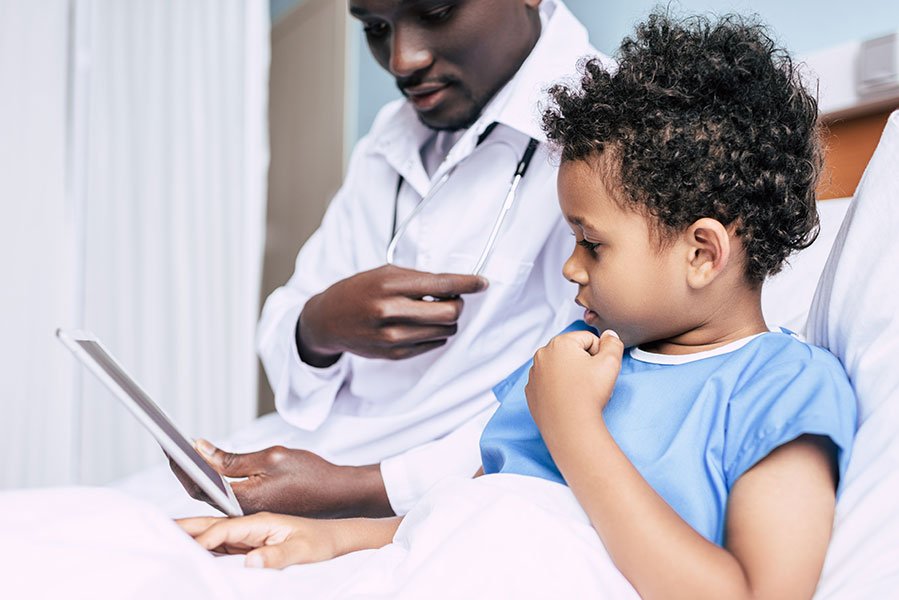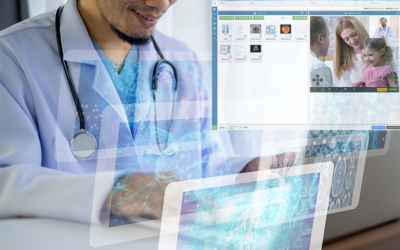The Challenge:
Facilitating healthcare for the 72% of Kenyans who live outside of urban areas and face long journeys to seek care in a health system that’s already buckling from overcrowded hospitals and healthcare worker scarcity
Dr. Carol Waweru, Gertrude’s Hospital Foundation Manager
For the nearly three-fourths of Kenya’s population who live outside of urban areas, barriers to healthcare access in rural areas have serious consequences. Accessing adequate healthcare has long been a challenge for these populations, as most healthcare specialists and subspecialists live and work in urban centers. Patients often put off appointments and forgo treatment altogether to avoid expensive and time-consuming journeys to see doctors and specialists.
Healthcare workers in Kenya are limited as well, which compounds the problem. In 2020, Kenya had 12,792 registered physicians — a ratio of 26 physicians per 100,000 people. These challenges of rural healthcare delivery too often lead to overcrowding in limited medical facilities and high mortality rates among rural populations due to the inaccessibility of specialty care.
The program, which includes AMD Global Telemedicine’s virtual care platform and connected medical devices, launched in November 2021.

The Approach:
Leverage telemedicine technology for remote clinical exams that are as close to in-person care as possible for pediatric patients
Gertrude’s Children’s Hospital first developed a telehealth program in 2016 to improve access to healthcare in rural areas, specifically for children between the ages of 0 and 21, in two remote locations: Garissa County and Narok County.
Gertrude’s Children’s Hospital and its partners took learnings from the pilot program and applied them to the current Daktari Smart project, launching the new iteration in November 2021. Now, the hospital uses AMD’s AGNES Connect platform and integrated primary care devices to extend quality specialist care to children in four rural counties. The goal of the telehealth program is to further optimize the capacity and reach of healthcare delivery systems, allowing level IV and level V hospitals to access specialists. Through the Daktari Smart program’s use of AMD’s integrated devices, health workers at the local partner health facilities can connect with specialists at Gertrude’s Children’s Hospital by placing the medical devices on patients within local facilities while connecting patients directly to remote specialists. This avoids any misconceptions about a patient’s symptoms and provides a real-time evaluation from the off-site specialists.
What’s more, the bandwidth requirement for the telehealth solution is low, ranging from 2Mbps to 8Mbps. This means that the platform can still collect data from connected medical devices and serve as a communication platform in rural and underserved areas that do not have fiber connectivity.
The Outcome:
Faster, More Accurate Diagnosis and Treatment to Improve Community Health
Serving four counties, soon to expand to six, with hopes of expansion to 47 counties
• Reducing time to accurate diagnosis and effective treatment
• Providing access to free specialist care and treatment to 32,400 children
in rural and underserved areas
• Reducing the amount of time and money needed for patients who would
otherwise have to seek tertiary care
• Building capacity for more than 300 health workers serving in the rural
health facilities
• Training 360 community health volunteers in the local communities
With the Daktari Smart program, Gertrude’s Children’s Hospital has been able to expand its reach from two counties to four and has ramped up its patient volume to more than 100 patients per month.
Where patients once had to travel for days to see specialists (some of the implementation sites are about 400 kilometers away from the hospital in Nairobi), they can now avoid such barriers to healthcare and receive treatment in a matter of hours. Instead of becoming discouraged and putting off appointments, as the hospital saw with its previous referral program, patients can now connect with specialists right from their local clinics. “We are able to assess the patient and come to a bottom-line diagnosis,” said Dr. Keven Pateti of Samburu County Referral Hospital. This accessibility shortens the time needed for an accurate diagnosis and effective treatment.
For example, one young girl in a rural county visited a local healthcare facility and was connected with a specialist through the Daktari Smart program. She had previously been diagnosed with malaria at a local clinic, but specialists from Gertrude’s Children’s Hospital recognized that her correct diagnosis was actually cancer. With this discovery, specialists are now able to develop and help the child navigate a proper treatment plan.
Dr. Renson Mukhwana, Pediatrician at
Gertrude’s Children’s Hospital
What our customers are saying …
Dr. Lisa Gwynn
“AMD is a telehealth company that has always been dependable, and extremely knowledgeable in assisting with choosing the right equipment to meet our needs. Their customer service and technical support of our programs has been impeccable.”
Ryan Baker, MHA
“After searching and speaking with many companies I found AMD Global Telemedicine to be trustworthy and realistic when setting expectations on their deliverables. They spent the time to really work with us to develop a telemedicine solution that fit out individual company needs.”
Dr. Waseem Ghannam
“Best in class technology and world class service! The team at AMD Global Telemedicine help power organizations in serving patients, via their HIPAA-compliant telehealth platform.”




